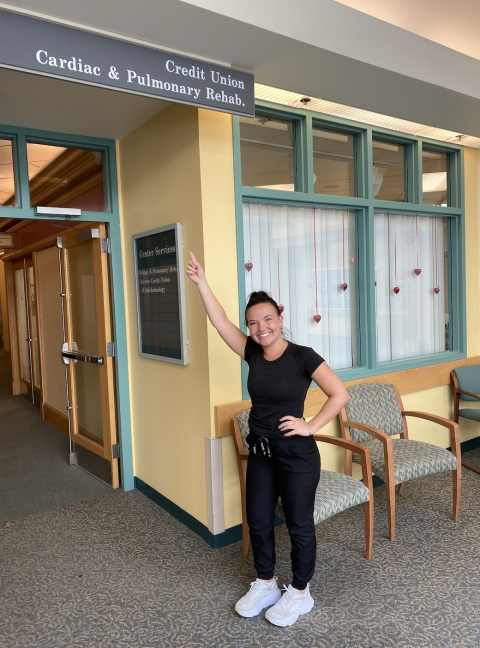My Summer Internship Experience at Dartmouth Hitchcock Medical Center

A Firsthand Account of Carsey's Winant Fellowship Program
This summer I had the opportunity to intern at Dartmouth Hitchcock Medical Center (DHMC) in Cardiac Rehabilitation. This experience provided a comprehensive insight into patient care, particularly for those recovering from cardiac events. The internship allowed me to connect with patients on a personal level, support them in their recovery journey, and encourage healthy lifestyle changes.
Teaching Cardiac Rehab Classes
Throughout the internship, I worked with patients diagnosed with various cardiac conditions, each with their unique stories and challenges. My role involved not just guiding them through their physical rehabilitation, but also offering emotional support. Understanding their backgrounds, fears, and motivations helped me to better support and encourage them to embrace the rehabilitation process. A significant part of my daily responsibilities included teaching three cardiac rehab classes a day, three days a week. These classes were designed to educate patients on the importance of exercise and guide them through safe and effective routines. I regularly monitored their blood pressure and heart rhythms to ensure they were exercising within safe parameters. Additionally, I facilitated discussions on nutrition and exercise guidelines, reinforcing the importance of these factors in recovery and long-term health.
Monitoring Patient Safety
I created three projects throughout my 10 weeks at DHMC. Most of the patients are 50–90 years old and struggle with balance. The first project involved creating a balanced exercise brochure that patients could take home. I encouraged them to incorporate these exercises into their routines at least three days a week. The positive feedback I received was overwhelming and made the project very rewarding. The second project was a resistance training packet focused on hand-weight exercises. At the end of each class, we dedicated about 10 minutes to weights. Since many patients had weights at home but were unsure how to use them effectively, I created this packet with illustrated exercises and detailed descriptions to guide them. The final project was a weekly exercise log designed to help patients stay accountable, as it's recommended that they exercise at least five days a week. Each time they came to class, we discussed the exercise they had done the previous day. The log provided clear expectations, and patients enjoyed using it to track their progress. These projects not only enhanced my experience but also made a meaningful impact on the patients' rehabilitation journey.
Guidance Towards Healthier Choices
Twice a week, I had the privilege of conducting 90-minute one-on-one sessions with each new patient. During these sessions, we discussed their medical history, set goals for rehab, and conducted a series of baseline tests. One key test was the 6-minute walk, which I administered on the patient's first and last day, typically around 6 weeks apart. We believe that this time frame is sufficient for patients to feel improvements, establish a routine, and gain confidence to continue exercising at home. Every patient I worked with this summer showed significant progress, with each gaining over 200 feet or more on their final walk test. Additionally, we assessed body composition at the beginning and end of the program for most patients. The results were encouraging, every patient gained muscle mass and reduced fat mass by the end of the program. One of the most rewarding aspects of this internship was witnessing the remarkable progress each patient made and seeing how much happier and confident they were upon graduating form the program.
Personalized Care and Progress Tracking
Beyond the rehabilitation classes, I had the chance to observe a variety of clinical procedures. I spent time in the catheterization lab, where I watched percutaneous coronary intervention (PCI) procedures and transcatheter aortic valve replacement (TAVR) surgeries. These experiences deepened my understanding of the procedures that many of our patients had undergone. I also shadowed doctors and nurses during pre- and post-surgery rounds, gaining insights into the continuum of care that cardiac patients receive. Part of my role involved visiting patients on the inpatient floors. Here, I had the important task of educating them about the benefits of cardiac rehabilitation. I explained how participation in rehab could significantly aid their recovery and help prevent future cardiac events. These conversations were crucial in motivating patients to take an active role in their recovery.
Reflecting on a Rewarding Experience
My summer internship at DHMC was a deeply enriching experience that solidified my passion for working in cardiac rehab. The hands-on experience of teaching, monitoring, and directly interacting with patients, combined with the clinical observations, provided a well-rounded perspective on cardiac care. This experience has not only enhanced my skills but also strengthened my commitment to promoting heart health and supporting patients through their recovery journeys.
Gain Work Experience in the Nonprofit or Government Sector
Do you want a hands-on learning experience like Ella's? The Winant Fellowship program is open to UNH juniors and seniors who live in New Hampshire! Along with the hands-on experience, the Fellowship pays a generous stipend for your work. If you're interested in the Winant Fellowship, visit our website to learn more.